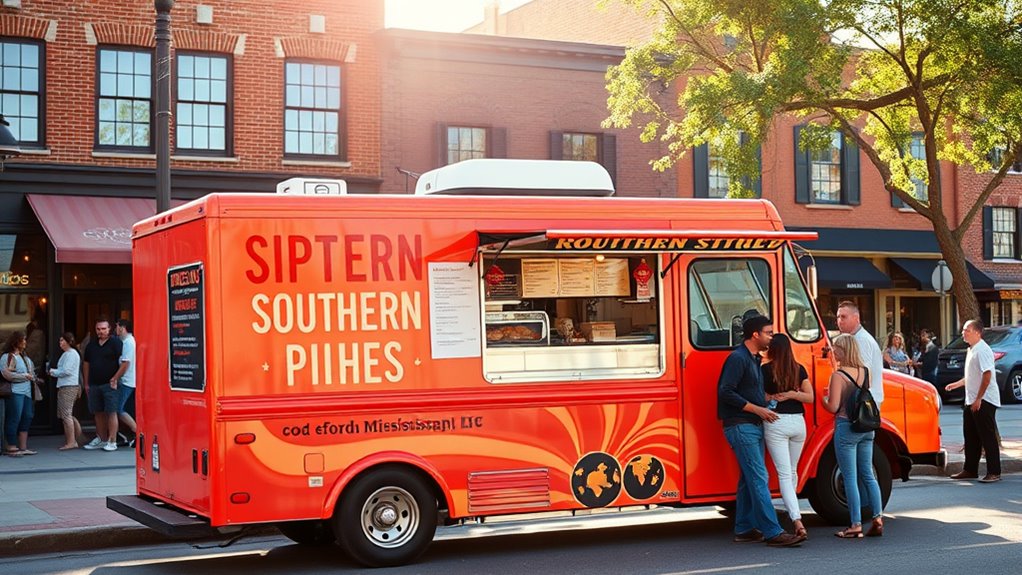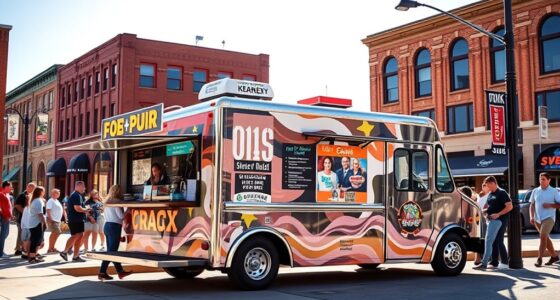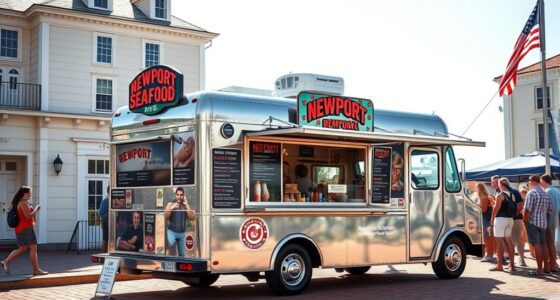To open a food truck in Oxford, Mississippi, you’ll need permits like a city privilege license, health, fire safety, and a Mississippi tax ID, with costs around $250–$275 annually. Secure prime locations near the university, parks, or festivals to attract customers, and craft a menu featuring regional favorites like fried chicken or barbecue. Use social media and community events to market your truck effectively. For more tips on staying compliant and building local connections, keep exploring this guide.
Key Takeaways
- Obtain necessary permits including city licenses (~$250/year), fire safety (~$100/year), property owner consent, and health inspections.
- Equipment costs range from $30,000 to $150,000, with initial supplies around $2,000–$3,000, plus annual licensing fees.
- Prime locations include University entrances, downtown districts, parks, and office areas, with participation in local events and markets.
- Develop a menu featuring Southern favorites like fried chicken and barbecue, sourcing ingredients locally and following food safety laws.
- Promote your truck via social media, participate in festivals, and build community partnerships to boost visibility and customer loyalty.
Navigating Permit Requirements and Application Procedures
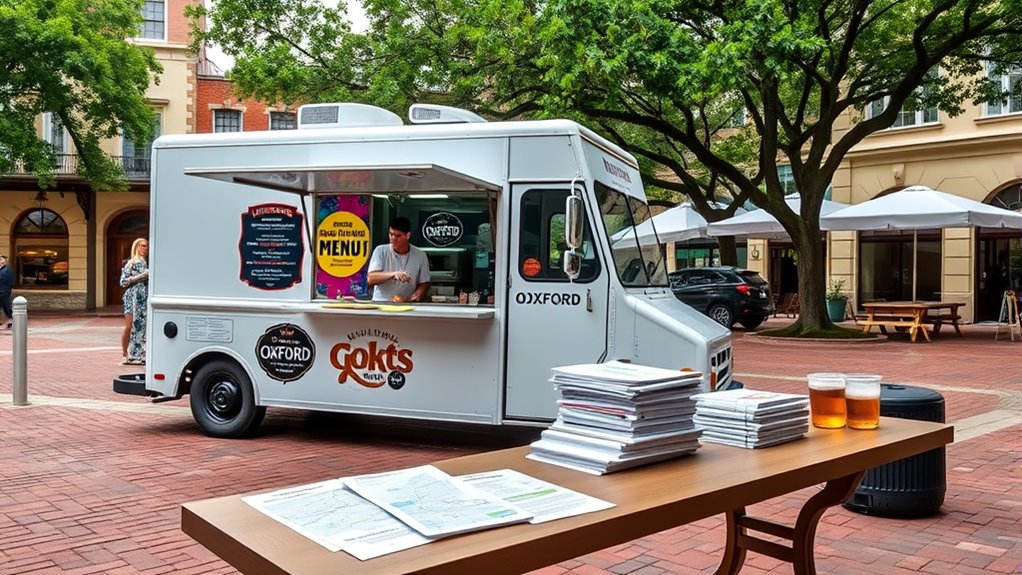
Managing permit requirements and application procedures in Oxford, Mississippi, can seem complex, but understanding the key steps facilitates the process. First, you’ll need to obtain a City of Oxford Privilege License and a food vending permit from the Mississippi Department of Health (MSDH). You must also secure an annual fire safety permit from Oxford Township and a state tax number from the Mississippi Department of Revenue. For each location, get property owner consent. Your application should include a detailed list of products, proof of liability insurance (minimum $500,000 coverage), and valid vehicular insurance. You’ll also need a written indemnity agreement and relevant correspondence. Additionally, your food truck must operate under an approved kitchen and pass health and fire inspections. Contact local agencies for guidance and ensure all documentation is complete before submitting your application. It is important to note that all inspections and permits must be current and maintained annually to operate legally in Oxford. Staying updated on local regulations and requirements ensures ongoing compliance and smooth operation.
Understanding the Cost Structure for Your Food Truck Venture
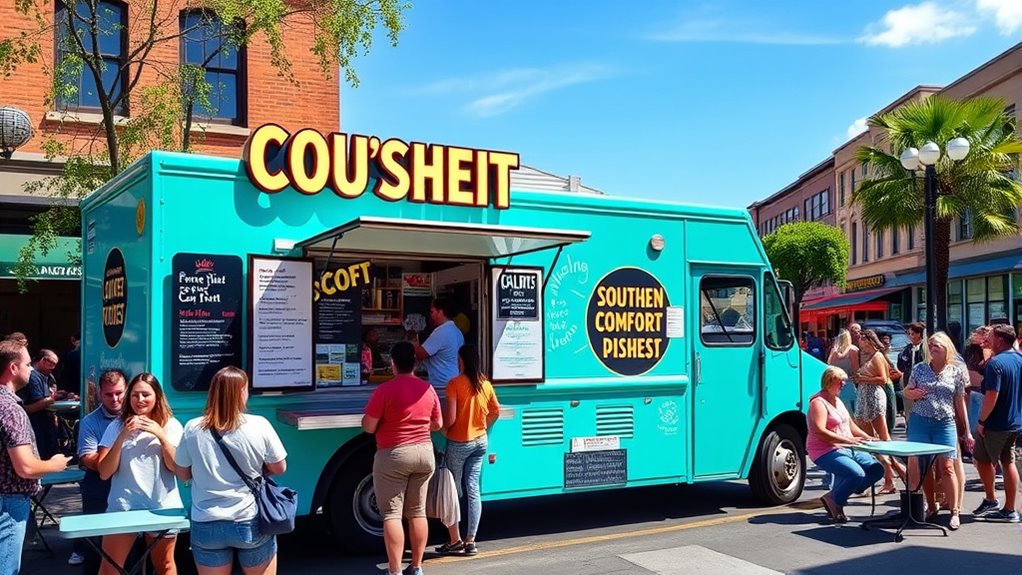
Understanding your food truck’s costs is essential for success. You’ll need to budget for permit expenses, equipment, supplies, and ongoing operational and licensing fees. Being clear on these expenses helps you plan effectively and keep your venture profitable. Accurately estimating startup costs allows you to secure appropriate funding and avoid unexpected financial shortfalls. Additionally, understanding the cost benefits of glycolic acid can be useful if your menu includes skincare or wellness products, enhancing your overall business approach.
Permit Expenses Breakdown
Starting a food truck in Oxford requires budgeting for various permits that guarantee legal operation and compliance. The Mobile Food Vending permit costs about $250 annually per vehicle or cart, covering administrative and regulatory expenses. Additionally, you’ll need a $100 annual permit from the Oxford Township Fire Department, essential for fire safety compliance. A retail food permit from the Mississippi State Department of Health is mandatory if you’re preparing and serving food for pay, with fees possibly including plan review costs if your setup is new or considerably changed. Permit renewal involves compliance inspections, typically required up to 60 days before expiration. Expect to cover application fees, supporting documentation requirements, and potential costs for inspections, ensuring your food truck meets all health, fire, and zoning regulations. Each mobile unit must also undergo inspections by the Oxford Fire Department to ensure safety standards are met. Moreover, understanding the permitting process thoroughly can help you avoid delays and unexpected costs during your launch.
Equipment and Supplies Costs
Investing in the right equipment and supplies is a key step in launching your food truck in Oxford. Used trucks typically cost between $30,000 and $44,000, depending on condition and included features, while brand-new custom-built trucks range from $75,000 to $150,000 nationwide. Essential kitchen equipment like grills, fryers, refrigerators, and sinks can add several thousand dollars, especially with safety features like fire suppression systems. Initial inventory costs for food and ingredients usually fall between $2,000 and $3,000, depending on your menu complexity. Additionally, you’ll need serveware, which costs around $300 initially, and smallwares such as knives, pots, and utensils. Consider equipment for storage, warming, and payment processing to ensure smooth daily operations. Proper equipment selection can maximize efficiency and help ensure your food truck operates smoothly from day one. Incorporating food truck-specific equipment can further optimize your setup and workflow.
Operational and Licensing Fees
Managing the financial requirements for operating a food truck in Oxford involves more than just equipment costs. You’ll need to budget for several key fees:
- Mobile Food Vending Permit: Expect to pay around $250 to $275 annually per truck. This covers city oversight and is required for legal operation. Obtaining this permit ensures your truck complies with local regulations and can operate in designated areas. Additionally, some areas may require proof of food safety training or certification, which can incur extra costs.
- Additional Licenses: You must obtain a Food Vending Permit from the Mississippi Department of Health, register for a state tax number, and secure fire safety approval—all with associated costs. These additional licenses and registrations help maintain health standards and legal compliance.
- Insurance & Business Licensing: Liability insurance costs start at $500,000 coverage, plus a city business license ranging from $50 to $400 annually, depending on your circumstances. Securing proper insurance protects your business from unforeseen liabilities.
These fees help to ensure you’re compliant and ready to serve within Oxford’s regulations.
Prime Locations to Maximize Foot Traffic and Visibility
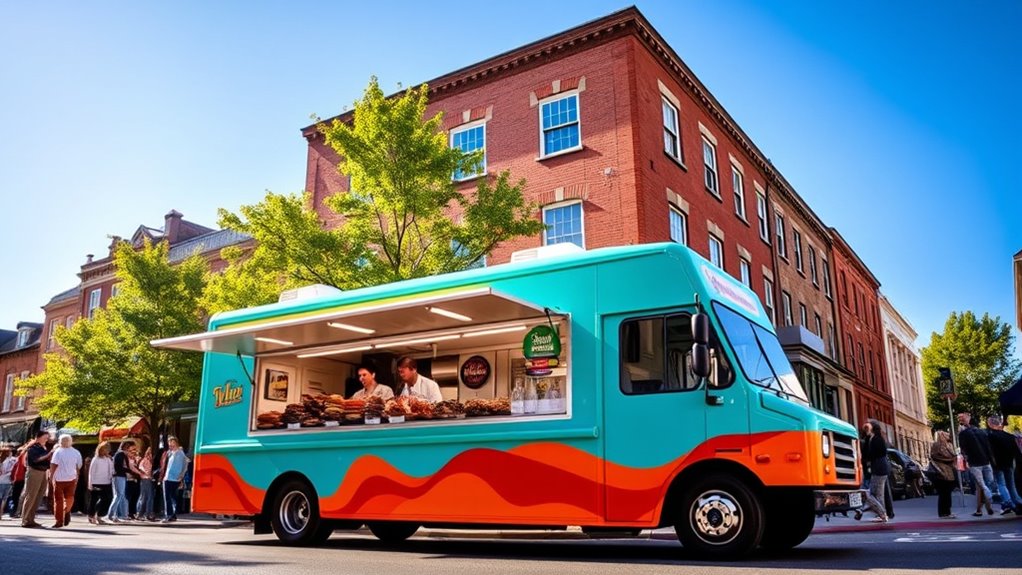
Choosing the right locations is essential for maximizing foot traffic and visibility for your food truck in Oxford. Near the University of Mississippi, areas around main entrances and popular hangouts draw large crowds, especially between 10 am and 4 pm on weekdays. Keep in mind, game days boost traffic but come with placement restrictions. Downtown Oxford’s retail district offers pedestrian-friendly streets, farmers’ markets, and festivals, attracting locals and tourists—higher foot traffic occurs during evenings and weekends. Parks and recreation areas with picnic spots and sports fields see families and groups, especially during seasonal events. Office complexes bring a steady lunchtime crowd, especially when positioned near main entrances. Finally, special events and markets offer prime opportunities to serve large crowds, provided you coordinate permits and placements in advance. Incorporating ethical hacking strategies can help identify optimal locations and ensure your setup is secure from potential threats or disruptions during busy times.
Crafting a Menu That Appeals to Local Tastes and Regulations
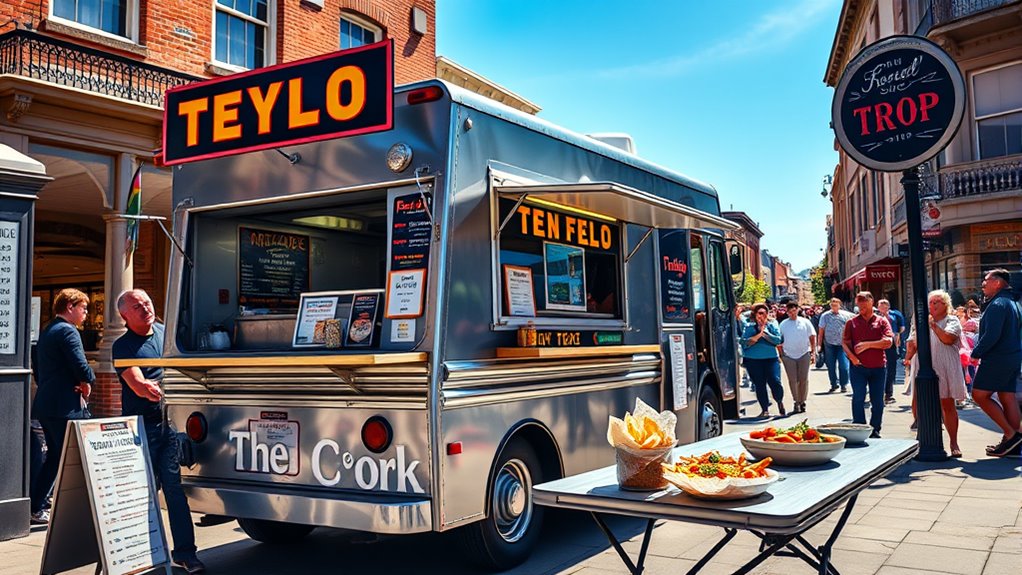
To succeed with your food truck, you need a menu that resonates with Oxford’s local tastes and meets state regulations. Focus on incorporating Southern favorites like fried chicken and barbecue while ensuring your ingredients and handling comply with food safety laws. Balancing regional flavors with practical, compliant offerings will help attract customers and keep your operation running smoothly. Trending developments in the area also highlight the importance of maintaining high standards and staying aware of local regulations to ensure your business remains compliant and successful. Additionally, understanding food safety laws and proper handling procedures can prevent health issues and fines, contributing to your long-term success.
Local Flavor Integration
How can a food truck in Oxford seamlessly blend local flavors into its menu to appeal to residents and visitors alike? First, focus on Southern classics like po-boys, barbecue, and sides such as collard greens and cornbread, which resonate with local tastes. Second, incorporate regional influences from New Orleans and Mississippi Delta cuisine using bold, smoky, and slightly sweet flavors like bourbon brown sugar and smoked ham. Third, source ingredients locally—think Mississippi catfish, seasonal vegetables, and regional cheeses—to boost authenticity and support the community. Engaging with local farmers and suppliers can also help ensure freshness and foster community relationships. By combining these elements, your menu stays true to regional culinary heritage while appealing to diverse palates. This approach creates a memorable, authentic experience that keeps customers coming back for more.
Regulatory Compliance Essentials
Crafting a menu that appeals to local tastes while staying compliant with regulations requires careful planning and understanding of the rules governing food service in Oxford. You must guarantee all foods meet health standards enforced by the Mississippi State Department of Health. Menus should avoid unapproved ingredients and handle hazardous foods with strict temperature and safety controls. Any menu changes that profoundly alter preparation processes need prior approval. All ingredients must come from approved sources to prevent contamination. Additionally, clear allergen information and safe handling practices are essential. You’ll also need to obtain a Mobile Food Vending permit, costing $250 annually, and secure a food permit unless exempt. Proper wastewater disposal, sanitation, and equipment standards are crucial to comply with state and local health codes, ensuring safety and legality.
Effective Marketing Strategies to Grow Your Customer Base
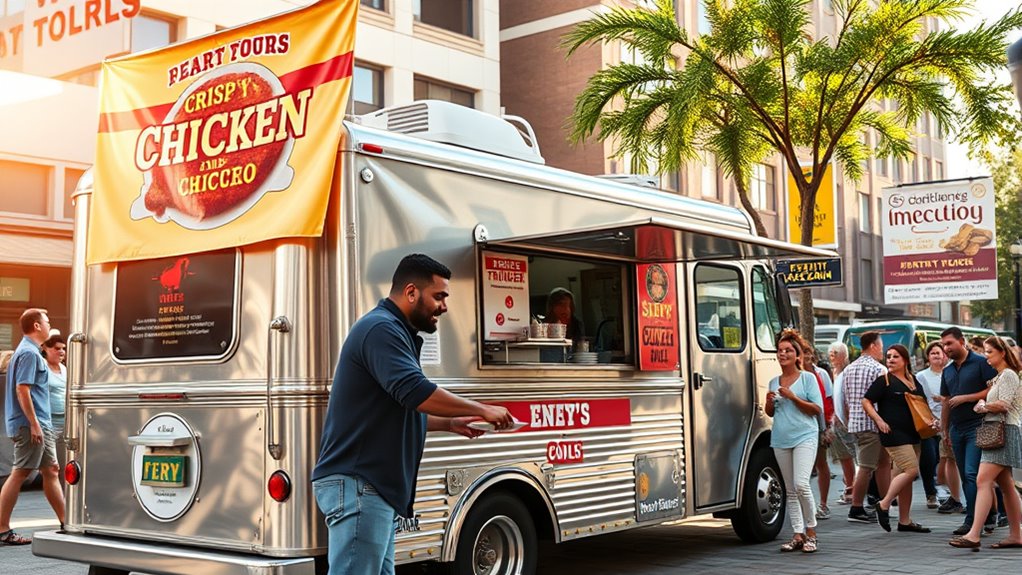
Implementing effective marketing strategies is essential for food trucks aiming to expand their customer base. Social media is a powerful tool—68% of food trucks use it regularly, with Facebook leading at 75%. Campaigns on social platforms can boost sales by around 20%, and 40% of customers discover trucks through social media ads. To maximize your reach:
Effective food truck marketing relies heavily on social media, with Facebook leading and boosting sales by 20%.
- Leverage social media platforms like Facebook for consistent, engaging content.
- Participate in local events and festivals to increase visibility and build community ties.
- Develop loyalty programs—such as punch cards or rewards—to encourage repeat visits and increase customer lifetime value.
- Incorporating social sharing rewards into your loyalty programs can increase your social media reach by up to 50% social sharing rewards.
- Regularly analyzing your analytics data can help optimize your marketing efforts and identify the most effective strategies.
Tips for Ensuring Compliance and Smooth Operations
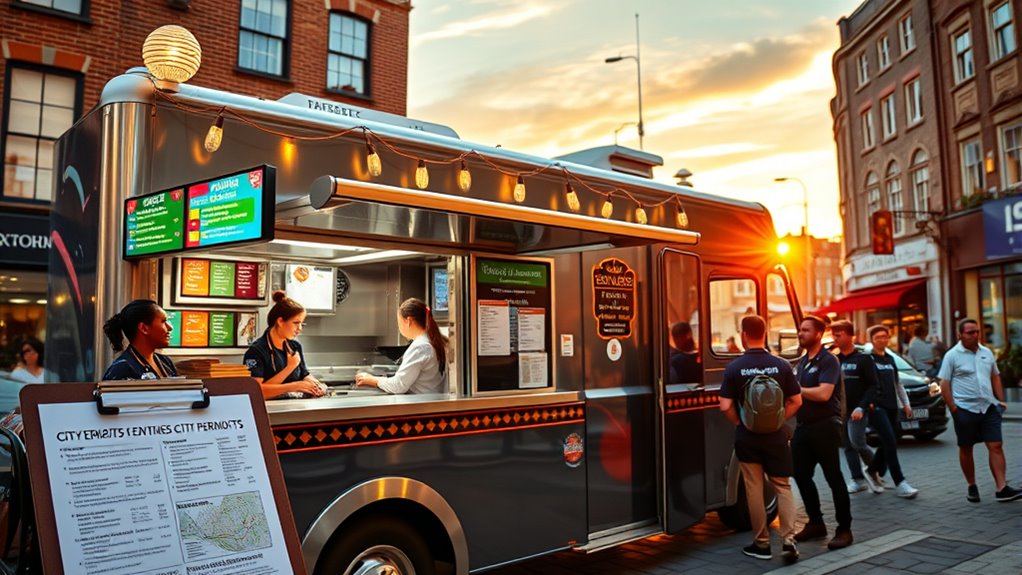
Ensuring compliance and maintaining smooth operations are essential for your food truck’s success in Oxford. Stay ahead by keeping up with licensing, permits, and health standards. Always renew your Privilege License and food service permits annually. Operate only on approved private properties within designated zones, and stick to permitted hours—Monday to Saturday from 6 a.m. to 2 a.m., and Sunday until 10 p.m. Remember, city departments can revoke or restrict your location if safety or convenience is compromised. Regularly pass health and safety inspections by the Fire Department and MSDH. Use this table as a quick guide:
| Compliance Area | Key Action | Responsible Authority |
|---|---|---|
| Permits & Licensing | Renew annually; keep documentation up-to-date | City Clerk & MSDH |
| Location & Hours | Operate only on approved property; adhere to hours | Planning & Police Departments |
| Food Safety & Equipment | Maintain sanitation; pass inspections | Fire Dept & Health Inspectors |
Additionally, up-to-date equipment are crucial for online applications and communication, so using up-to-date browsers ensures smooth digital interactions.
Building Community Connections and Leveraging Local Events

Building strong community connections and making the most of local events can markedly boost your food truck’s visibility and reputation in Oxford. To do this effectively, consider these strategies:
Forge community ties and embrace local events to elevate your Oxford food truck’s profile.
- Partner with local businesses, community organizations, and university groups to increase brand trust and reach a larger audience.
- Participate in popular Oxford events like the Double Decker Festival or farmers’ markets to connect directly with customers and showcase your menu.
- Engage online by using location tags, event hashtags, and collaborating with local influencers to boost digital presence and attract event attendees.
- Familiarize yourself with the Ordinance and Permitting Process to ensure compliance and smooth operation of your mobile food vending business.
- Understanding cookie policies can help you better tailor your digital marketing efforts, ensuring compliance and improving customer trust.
Frequently Asked Questions
What Are the Specific Health and Safety Standards for Food Truck Equipment?
You need to follow strict health and safety standards for your food truck equipment. Make certain surfaces contacting food are smooth, nonabsorbent, and easy to clean. Maintain proper ventilation, temperature controls, and sanitation protocols, including regular cleaning and sanitizing. Use calibrated thermometers, keep cold foods at 41°F or below, hot foods at 135°F or above, and dispose of waste properly. Keep all equipment in good repair, compliant with FDA and local regulations, to guarantee safety.
How Do Weather Conditions Impact Food Truck Operations in Oxford?
Did you know Oxford experiences frequent thunderstorms during summer? Weather conditions considerably impact your food truck operations by reducing customer traffic during storms, complicating setup and teardown, and risking equipment malfunctions in humidity or rain. You’ll need flexible schedules, weather-appropriate menus, and real-time updates to keep customers engaged. Preparing for sudden closures and adapting your offerings to hot, humid days helps you stay afloat despite unpredictable weather challenges.
Are There Restrictions on Selling Alcohol or Beverages From Food Trucks?
You can’t sell alcohol from your food truck within Oxford city limits due to strict local laws. State legislation allows limited alcohol sales if the truck prepares and cooks food, but you still need special permits, and sales are restricted near schools and churches. Open container laws apply, so alcohol must stay within the truck. You’ll focus on non-alcoholic drinks and food, as alcohol marketing and sales are heavily regulated.
Can I Operate a Food Truck Part-Time or Only During Certain Hours?
You can operate your food truck part-time or during specific hours, as long as you follow the city’s rules. Your operation must stay within the permitted hours—6 a.m. to 1 a.m. on Saturday-Wednesday and until 2 a.m. on Thursday and Friday. You’ll need the proper permits, operate on private property, and be present during business hours, but flexible scheduling within those limits is totally doable.
What Insurance Requirements Are Recommended for Food Truck Owners in Oxford?
You should prioritize securing sufficient insurance coverage for your food truck in Oxford. It’s recommended to have at least $500,000 in liability insurance, with the city named as an additional insured. You’ll need commercial auto insurance, property coverage, and possibly liquor liability if serving alcohol. This protection helps cover injuries, property damage, and vehicle issues, ensuring you stay compliant with local laws and protect your business from potential risks.
Conclusion
Starting your food truck in Oxford is like planting a seed— with the right permits, location, and marketing, you’ll see it flourish. Stay compliant, connect with the community, and adapt your menu to local tastes. Keep your operations smooth and your passion visible, and your truck will become a staple in the local scene. With dedication and a sprinkle of creativity, you’ll turn your food truck dream into a tasty reality.
